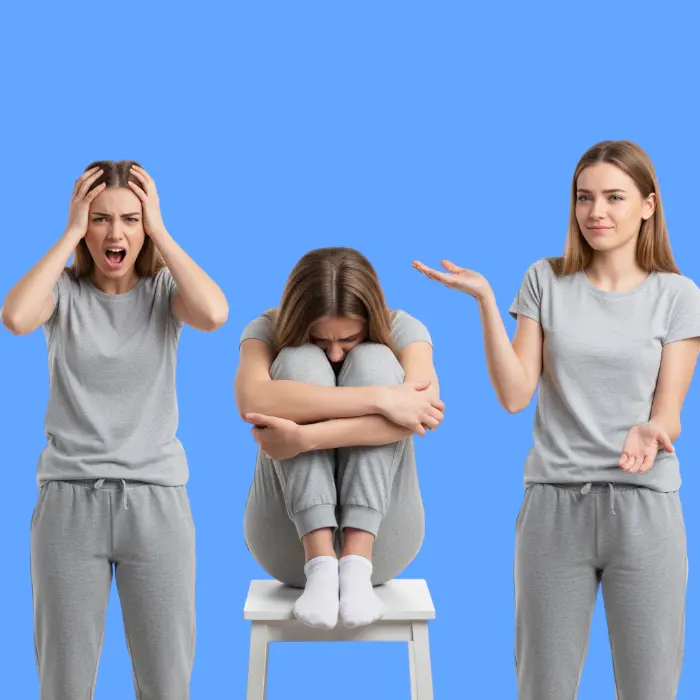what is schizophrenia?
Schizophrenia is a chronic mental disorder that affects how a person thinks, feels, and behaves. The person affected lives in a different world where reality and imagination blend, making it hard to distinguish between real life and internal thoughts.
In many cases, the illness begins suddenly, and the patient's personality changes noticeably. They may start to isolate themselves or behave in unusual ways. Some people think schizophrenia means split personality, but in reality, it is a single mental condition that affects perception and behavior.
what are the causes of schizophrenia?
Although the exact cause of schizophrenia is unknown, several factors may contribute to its development, including:
- Genetics, especially if a family member has schizophrenia.
- Chemical imbalances in the brain, such as dopamine dysfunction.
- Structural or functional abnormalities in the brain.
- Severe psychological trauma during childhood or adolescence.
- Viral infections during pregnancy or early childhood.
- Excessive use of drugs or alcohol.
- Ongoing psychological and social stress.
what are the common symptoms of schizophrenia?

Symptoms vary from person to person, but they often include a range of psychological and behavioral signs, such as:
- Hallucinations, like hearing voices or seeing things that aren't real.
- Delusions, such as believing someone is watching or chasing them.
- Disorganized thinking and difficulty organizing thoughts or communicating.
- Social withdrawal and avoiding family and friends.
- Reduced or absent emotional expression.
- Loss of motivation and interest in daily life.
- Neglect of personal hygiene and healthy habits.
- Severe and unexplained mood swings.
when should you see a doctor?
It is important to consult a psychiatrist immediately upon noticing any of the following symptoms, especially if they persist or affect daily life, including:
- Frequent hallucinations or delusions.
- Sudden changes in behavior or personality.
- Complete social or family withdrawal.
- Inability to concentrate or make decisions.
- Sleep or appetite disturbances.
- Repetitive illogical or incoherent speech.
- Tendency to harm oneself or others.
- Refusal to accept treatment or acknowledge the illness.
what are the treatment options for schizophrenia?
Treatment aims to control symptoms and improve the patient's quality of life. Available options include:
- Medication using appropriate antipsychotics for each case.
- Individual psychotherapy to help the patient understand their condition.
- Social rehabilitation to train the patient in daily skills.
- Family therapy to support relatives in dealing with the patient.
- Support groups for sharing experiences among patients.
- Hospitalization in acute or emergency cases.
- Electroconvulsive therapy in specific situations.
can schizophrenia be cured?
Schizophrenia cannot be completely cured, but it can be managed and controlled with proper treatment. Many patients live stable lives if they adhere to medication and psychological support.
Recovery speed depends on factors such as the type of schizophrenia, the patient's commitment to treatment, and the family and social support they receive.
what are the prevention tips for schizophrenia?
Although there is no guaranteed way to prevent schizophrenia, some tips may reduce the risk or help in early detection, including:
- Avoiding drug and alcohol abuse.
- Managing psychological stress in a healthy way.
- Seeking psychological support after trauma.
- Caring for mental health from childhood.
- Monitoring unusual behavioral changes.
- Strengthening healthy social relationships.
- Engaging in sports and daily activities.
- Maintaining a balanced lifestyle.
what are the possible complications of schizophrenia?
If left untreated, schizophrenia may lead to complications that significantly affect the patient's life, including:
- Suicide or suicidal thoughts.
- Chronic depression and anxiety.
- Obsessive-compulsive disorder.
- Substance or alcohol abuse.
- Problems in social and family relationships.
- Inability to work or study.
- Deterioration of mental and physical health.
- Complete isolation and withdrawal.
frequently asked questions about schizophrenia
Does schizophrenia mean multiple personalities?
No, schizophrenia is a thinking disorder, not a split personality.
Can schizophrenia affect children?
Rarely appears in childhood, but usually starts in adolescence or early adulthood.
Is schizophrenia hereditary?
Yes, genetics play a role in increasing the risk.
Can a patient live a normal life?
Yes, with proper treatment and psychological support.
article summary
Schizophrenia is a chronic mental disorder that affects thinking, behavior, and emotions. Despite its challenges, early treatment and family support can help the patient live a better life.
It is crucial not to ignore the symptoms and to seek psychiatric help immediately, as schizophrenia is not a weakness but a medical condition that requires ongoing care and treatment.